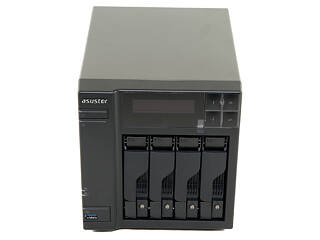 1
1
Asustor AS7004T Review
Specifications »Introduction

We would like to thank Asustor for supplying the review sample.

Look at high-end NAS servers and Asustor comes up as a company that has and still is taking huge steps forward with such new releases as its two rack-mount servers and the AS7004T, AS7008T, and AS7010T, which is more than enough to address the needs of small- and medium-sized business environments. Asustor also managed to catch up to the tough competition pretty quickly despite being a new company to the rather hard-fought-over NAS market, and their products, especially their software, have nothing to be jealous of when compared to operating systems that have been developed and refined over the many years before Asustor's appearance. The key factor to their success wasn't only their ability to adapt to the NAS market's rather special needs quickly as most people working for Asustor had already spent some time time working for other NAS brands before.
In today's review, we will take a look at the AS7004T. Its hardware is very strong for a NAS since it utilizes a dual-core Intel i3 processor where almost all competing offers of the category use Intel CPUs with less processing power instead. The i3 is backed by 2 GB of RAM you can upgrade to 16 GB, so we expect this NAS to perform incredibly well no matter what. The AS7004T, as its model number implies, can take up to four HDDs, and its HDMI and S/PDIF ports allow it to easily handle an enthusiast's multimedia needs. A large number of USB and eSATA ports and two Ethernet ports that support port trunking complete the bundle. The NAS also has an LCD screen that can provide its user with invaluable information; you can even perform some basic administrative tasks via the display without the need of a client.
The AS7004T is definitely an interesting NAS since it has all the features an administrator would crave while also meeting the needs of enthusiast users with its fast network speeds and rich multimedia capabilities. But let's not get ahead of ourselves as a NAS not only depends on its hardware but also its software; it is the software that insures the hardware is exploited fully while running reliably. Simply put, a really strong NAS without perfectly optimized firmware doesn't stand a chance against QNAP's and Synology's competing offers since the latter have put years on end into developing their top-notch firmware, which sets the bar incredibly high. However, our previous experience with Asustor's firmware left a very good impression on us, and given they are actively releasing firmware updates quite often, we are very curious to see how their offering will compare to those from QNAP and Synology.
May 13th, 2024 08:34 EDT
change timezone
Latest GPU Drivers
New Forum Posts
- AIO Water Cooler vs Tower Air Cooler (14)
- Rare GPUs / Unreleased GPUs (1881)
- 4K Gamers, How much VRAM do you have? (134)
- Purchased an AX1200i PSU as part of some forward planning, what tier is this PSU? (63)
- Cyberpunk 2077 Game Discussion (2127)
- Soundbar or 2.1 speaker for virtual 3d audio in PC games... (15)
- have LGA 1155 motherboard which xeon processor will fit ? (7)
- What's the best tube I can get for Schiit Vali 3 headphone amp under $30? (1)
- Long AM5 POST times (149)
- Why does my PC shut down even though it's connected to a UPS? (87)
Popular Reviews
- ZMF Caldera Closed Planar Magnetic Headphones Review
- Corsair MP700 Pro SE 4 TB Review
- Bykski CPU-XPR-C-I CPU Water Block Review - Amazing Value!
- ThundeRobot ML903 NearLink Review
- Upcoming Hardware Launches 2023 (Updated Feb 2024)
- CHERRY XTRFY M64 Pro Review
- AMD Ryzen 7 7800X3D Review - The Best Gaming CPU
- ASUS Radeon RX 7900 GRE TUF OC Review
- Corsair iCUE Link RX120 RGB 120 mm Fan Review
- Sapphire Radeon RX 7900 GRE Pulse Review
Controversial News Posts
- Intel Statement on Stability Issues: "Motherboard Makers to Blame" (266)
- AMD to Redesign Ray Tracing Hardware on RDNA 4 (224)
- Windows 11 Now Officially Adware as Microsoft Embeds Ads in the Start Menu (172)
- NVIDIA to Only Launch the Flagship GeForce RTX 5090 in 2024, Rest of the Series in 2025 (152)
- Sony PlayStation 5 Pro Specifications Confirmed, Console Arrives Before Holidays (119)
- AMD's RDNA 4 GPUs Could Stick with 18 Gbps GDDR6 Memory (114)
- AMD Hits Highest-Ever x86 CPU Market Share in Q1 2024 Across Desktop and Server (111)
- AMD Ryzen 9 7900X3D Now at a Mouth-watering $329 (104)
